| Listing 1 - 10 of 67 | << page >> |
Sort by
|

ISBN: 0804721386 Year: 1993 Publisher: Stanford, Calif. Stanford University Press
Abstract | Keywords | Export | Availability | Bookmark
 Loading...
Loading...Choose an application
- Reference Manager
- EndNote
- RefWorks (Direct export to RefWorks)
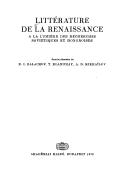
ISBN: 9630514087 9789630514088 Year: 1978 Volume: 3 Publisher: Budapest: Akadémiai Kiadó,
Abstract | Keywords | Export | Availability | Bookmark
 Loading...
Loading...Choose an application
- Reference Manager
- EndNote
- RefWorks (Direct export to RefWorks)
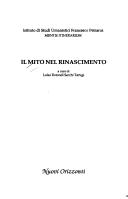
ISBN: 8885075312 9788885075313 Year: 1993 Volume: 4 Publisher: Milano: Nuovi orizzonti,
Abstract | Keywords | Export | Availability | Bookmark
 Loading...
Loading...Choose an application
- Reference Manager
- EndNote
- RefWorks (Direct export to RefWorks)
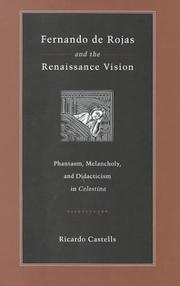
ISBN: 0271019840 9780271019840 Year: 2000 Publisher: University Park, Pa: Pennsylvania state university press,
Abstract | Keywords | Export | Availability | Bookmark
 Loading...
Loading...Choose an application
- Reference Manager
- EndNote
- RefWorks (Direct export to RefWorks)
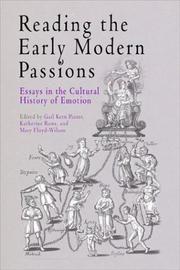
ISBN: 0812218728 0812237609 9780812218725 9780812237603 Year: 2004 Publisher: Philadelphia: University of Pennsylvania press,
Abstract | Keywords | Export | Availability | Bookmark
 Loading...
Loading...Choose an application
- Reference Manager
- EndNote
- RefWorks (Direct export to RefWorks)
History of civilization --- Literature --- anno 1400-1499 --- anno 1500-1599 --- European literature --- Emotions in literature --- History and criticism --- Emotions in literature. --- History and criticism. --- European literature - Renaissance, 1450-1600 - History and criticism --- European literature - 17th century - History and criticism
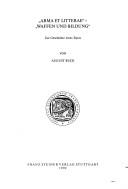
ISBN: 3515060006 9783515060004 Year: 1992 Volume: 28/3 Publisher: Stuttgart: Steiner,
Abstract | Keywords | Export | Availability | Bookmark
 Loading...
Loading...Choose an application
- Reference Manager
- EndNote
- RefWorks (Direct export to RefWorks)
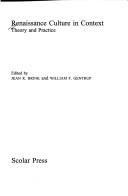
ISBN: 0859679500 9780859679503 Year: 1993 Publisher: Aldershot: Scolar Press,
Abstract | Keywords | Export | Availability | Bookmark
 Loading...
Loading...Choose an application
- Reference Manager
- EndNote
- RefWorks (Direct export to RefWorks)
Renaissance. --- European literature --- History and criticism. --- -Renaissance --- Renaissance --- Revival of letters --- Civilization --- History, Modern --- Civilization, Medieval --- Civilization, Modern --- Humanism --- Middle Ages --- History and criticism --- History --- European literature - Renaissance, 1450-1600 - History and criticism.
Book
ISBN: 9788867054343 8867054341 Year: 2015 Volume: 248 Publisher: Genova: Università di Genova. Scuola di scienze umanistiche,
Abstract | Keywords | Export | Availability | Bookmark
 Loading...
Loading...Choose an application
- Reference Manager
- EndNote
- RefWorks (Direct export to RefWorks)
Nature in literature --- Latin literature --- Literature, Medieval --- European literature --- History and criticism --- History and criticism. --- Natural history --- Philosophy, Ancient. --- Philosophy, Renaissance. --- Latin literature - History and criticism --- Literature, Medieval - History and criticism. --- European literature - Renaissance, 1450-1600 - History and criticism.
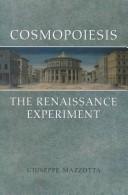
ISBN: 0802035515 0802084214 9780802035516 9780802084217 1282014544 1442673540 9786612014543 9781282014541 9781442673540 Year: 2017 Publisher: Toronto : University of Toronto Press,
Abstract | Keywords | Export | Availability | Bookmark
 Loading...
Loading...Choose an application
- Reference Manager
- EndNote
- RefWorks (Direct export to RefWorks)
Cosmopoiesis means world-making, and in this erudite, polemical book, Professor Mazzotta traces how major medieval and Renaissance thinkers invented their worlds through utopias, magic, science, art, and theatre. The Renaissance is usually read from a Cartesian or Hegelian (via Burckhardt) perspective. It is viewed as a time of individualities or it is studied in terms of disembodied ideas and abstract forms. Mazzotta calls for a new approach: the necessity to study the Renaissance in terms of the ongoing conversation of the arts and sciences. His is an encyclopedic grasp that takes into consideration literature, philosophy, politics, history, and theology. The book's theoretical premise lies in the thought of the eighteenth-century Italian philosopher, Giambattista Vico. Vico's own reading of the Renaissance, available in his New Science, is obliquely, yet clearly reproposed as the alternate interpretive key for opening up the deeper imaginative concerns of this extraordinary period of Western history. By a series of rigorous textual analyses that range from Poliziano to Ariosto, from Machiavelli to Bacon, to Shakespeare and Cervantes, "Cosmopoiesi"s highlights the ongoing dialogue between literature and philosophy (or literature and science, or, in Vichian terms, philology and philosophy) in some of the central texts of the time. In this dialogue across time and the barriers of space, the esthetic world - the world of the pastoral, romances, epics, utopian fictions, the theatre, and the lyric - far from signalling an evasion from history, is steadily and vitally engaged with the most pressing exigencies of the time. Consistently, the analyses conducted in "Cosmopoiesis" come to grips with these exigencies: the power of science, the relationship between politics and science, and the emergence of a new ethics in the midst of the secretive techniques by new elites in their exercise of political power. Above all, these central texts argue for a necessary reconstitution of the unity of knowledge, for the "encyclopedic" compass of the arts and sciences. The retrieval of this unity is made possible by reclaiming a role for the esthetic or contemplative mode of thought which underlies and shapes the most creative achievements in the world of making.
European literature --- Italian literature --- Philosophy, Renaissance --- History and criticism --- Philosophy, Renaissance. --- History and criticism. --- History of philosophy --- anno 1500-1599 --- Philosophy, Modern --- Renaissance philosophy --- European literature - Renaissance, 1450-1600 - History and criticism --- Italian literature - History and criticism --- Italienisch.
Book
ISBN: 1283221624 9786613221629 0748636854 9780748636853 9780748636846 0748636846 9780748636839 0748636838 9780748688692 0748688692 9781283221627 6613221627 0748636846 9780748636846 Year: 2011 Publisher: Edinburgh : Edinburgh University Press,
Abstract | Keywords | Export | Availability | Bookmark
 Loading...
Loading...Choose an application
- Reference Manager
- EndNote
- RefWorks (Direct export to RefWorks)
Treating the Renaissance as also the period that saw the birth of European colonialism, this book focuses on the interplay between the discovery of new lands and the re-discovery of old texts.
Classical literature -- Appreciation -- Europe -- History. --- Colonies in literature. --- European literature -- Renaissance, 1450-1600 -- History and criticism. --- Postcolonialisme --- Dans la littérature --- Classical literature --- European literature --- Appreciation --- History. --- History and criticism.
| Listing 1 - 10 of 67 | << page >> |
Sort by
|

 Search
Search Feedback
Feedback About UniCat
About UniCat  Help
Help News
News